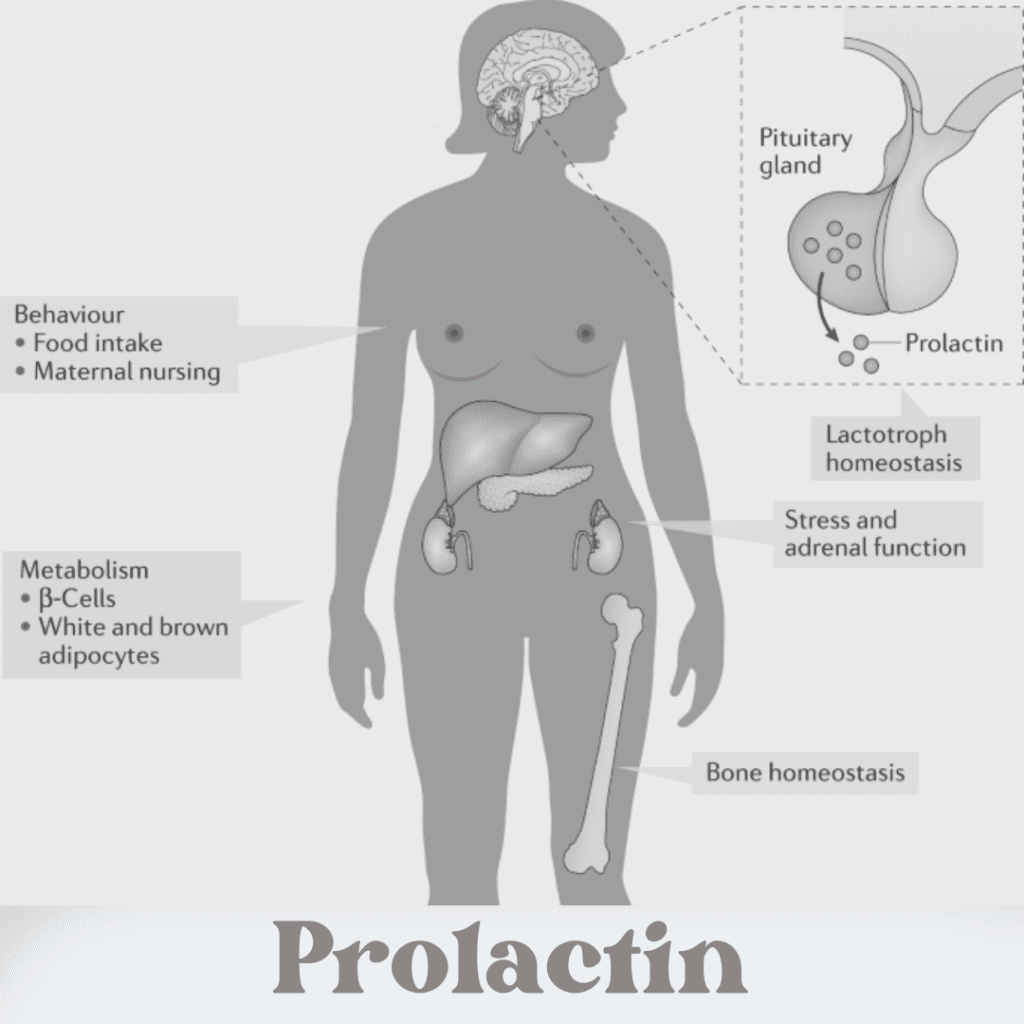Understanding Prolactin: Beyond Lactation

Prolactin, often referred to as the “milk hormone,” is a vital component of the human endocrine system, with functions that extend far beyond its role in lactation. While its primary purpose is to stimulate milk production in breastfeeding individuals, it plays a more significant role in our overall health and well-being. In this blog post, we’ll delve into the fascinating world of prolactin, exploring its functions, regulation, and the various aspects of its influence on the human body.
The Basics of Prolactin
Prolactin is a hormone secreted by the anterior pituitary gland, a pea-sized structure at the base of the brain. The name “prolactin” is derived from the Greek words “pro,” meaning “before,” and “lactis,” meaning “milk,” which accurately reflects its primary function – stimulating the mammary glands to produce milk. However, prolactin’s effects are not limited to lactation, and it has a broad spectrum of functions in people of all genders.
Primary Functions of Prolactin
- Milk Production and Lactation:The most well-known and primary function of prolactin is its role in stimulating and maintaining lactation in breastfeeding individuals. During pregnancy, high levels of prolactin prepare the mammary glands for milk production. After childbirth, the continued release of prolactin signals the mammary glands to produce milk. Prolactin is central to a breastfeeding mother’s ability to nourish her infant, providing essential nutrients and immune factors.
- Regulation of Reproduction:Beyond milk production, prolactin also has a significant impact on the reproductive system, particularly in women. During breastfeeding, prolactin helps suppress ovulation, serving as a natural form of birth control in the early postpartum period. This phenomenon is known as the Lactational Amenorrhea Method (LAM) and provides a level of contraception when specific criteria are met.
- Immune System Modulation:Prolactin plays a vital role in the body’s immune system. It contributes to the defense against infections and diseases by influencing the production and function of immune cells. Research has shown that prolactin affects the immune response to infections, autoimmune disorders, and inflammatory conditions.
- Metabolism and Weight Regulation:Prolactin is involved in the regulation of metabolism, particularly lipid (fat) metabolism. It influences the body’s utilization and storage of fat, which can impact body weight and fat distribution. Prolactin’s role in metabolism is an area of ongoing research with potential implications for understanding obesity and related health conditions.
- Stress Response:Prolactin is part of the body’s response to stress. When the body faces stressors, such as physical or emotional challenges, the release of prolactin is increased. This hormone, in conjunction with other stress-related hormones like cortisol, helps the body adapt to and cope with stressful situations.
Regulation of Prolactin Levels
The Hypothalamus-Pituitary Connection:
Prolactin’s regulation begins in the brain, where it interacts with two key structures: the hypothalamus and the anterior pituitary gland. The hypothalamus is responsible for releasing hormones that either stimulate or inhibit prolactin production by the pituitary gland.
- Dopamine Inhibition:The primary regulator of prolactin is dopamine, a neurotransmitter produced by the hypothalamus. Dopamine acts as an inhibitor, suppressing the secretion of prolactin by the pituitary gland. This means that under normal circumstances, dopamine keeps prolactin levels low when they are not needed.
- Stimulation by Suckling:One of the most well-known mechanisms for increasing prolactin levels is the act of breastfeeding. When a baby suckles at the breast, nerve signals are sent from the nipple to the hypothalamus. This leads to a decrease in dopamine release, which, in turn, allows the pituitary gland to release prolactin. The more frequently and effectively a baby feeds, the higher the prolactin levels, facilitating milk production.
- Pregnancy and Other Triggers:Prolactin levels can also be influenced by factors beyond breastfeeding. During pregnancy, the placenta produces a hormone known as human placental lactogen (hPL), which stimulates the mammary glands and increases prolactin secretion, preparing them for milk production. Additionally, various physiological stressors, sleep, and even sexual activity can temporarily elevate prolactin levels.
Possible Health Implications and Disorders Related to Prolactin
Reproductive Disorders:
Hyperprolactinemia: Elevated prolactin levels can interfere with the normal menstrual cycle, leading to irregular periods or even the absence of menstruation (amenorrhea) in women. This hormonal imbalance can also suppress ovulation, causing fertility issues and difficulties in conceiving. In some cases, hyperprolactinemia may lead to galactorrhea, the spontaneous flow of milk from the breasts unrelated to breastfeeding.
Hypoprolactinemia: Insufficient prolactin levels can hinder lactation in breastfeeding women and lead to inadequate milk production. It can also disrupt menstrual cycles, affecting fertility and reproductive health in women.
Sexual Dysfunction:
Hyperprolactinemia: In men, high prolactin levels can cause erectile dysfunction, reduced libido, and even infertility due to impaired sperm production. This condition can significantly impact a man’s sexual and reproductive health.
Pituitary Tumors:
Prolactinomas: Prolactinomas are benign tumors of the pituitary gland that secrete excess prolactin. These tumors can lead to hyperprolactinemia and cause a range of symptoms, including headaches, vision problems, and in some cases, other hormone imbalances due to the tumor’s size and location.
Bone Health:
Hyperprolactinemia: Persistently elevated prolactin levels, especially in women, can lead to reduced estrogen levels. This hormonal imbalance can affect bone density and increase the risk of osteoporosis, making bones more susceptible to fractures.
Mental Health:
Hyperprolactinemia: In some cases, high prolactin levels have been associated with mood disorders such as depression and anxiety. The exact relationship between prolactin and mental health is still an area of active research.
Side Effects of Medications:
Certain medications, particularly antipsychotics and antidepressants, can elevate prolactin levels as a side effect. This can lead to various symptoms, including menstrual irregularities, sexual dysfunction, and breast discharge.
Conclusion
Prolactin, often associated with lactation, plays a crucial role in both male and female reproductive health. Understanding its influence on menstrual cycles, fertility, and sexual function is vital for those trying to conceive or addressing issues related to sexual health.
Moreover, the careful regulation of prolactin is crucial for maintaining a healthy hormonal balance. Ongoing research in this field continues to provide valuable insights into how prolactin affects our reproductive systems and offers hope for individuals facing challenges in this area. With appropriate medical attention and treatment, many reproductive health issues related to prolactin can be effectively managed, allowing individuals to pursue their desired family planning goals.
Disclaimer
Please note that the information provided in this blog post is for informational purposes only and should not be considered a substitute for professional medical advice or diagnosis. If you have concerns about your prolactin levels or any related health issues, it is essential to consult with a qualified healthcare provider for a proper evaluation and guidance tailored to your specific situation.
Stay updated—subscribe now for informed empowerment!

